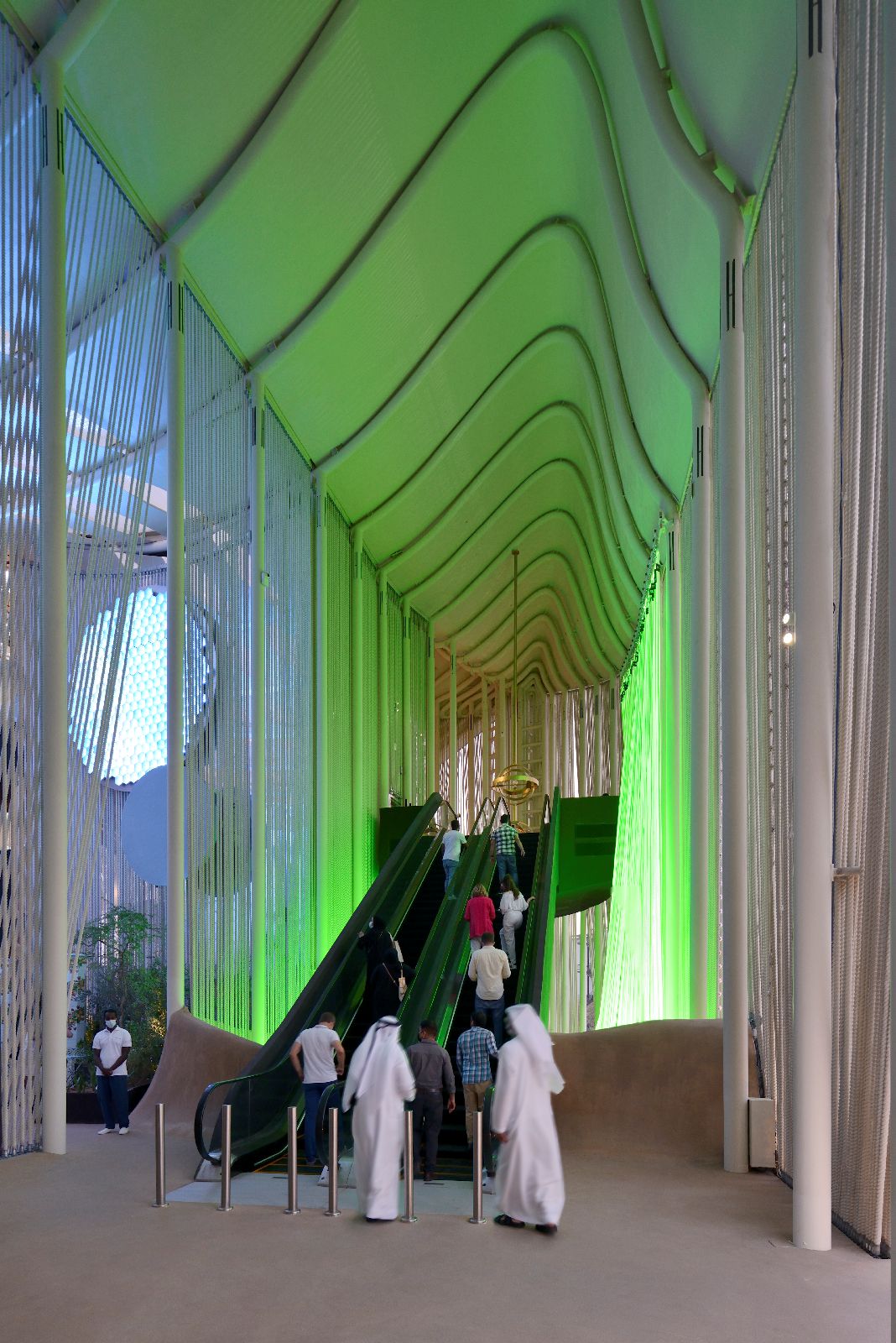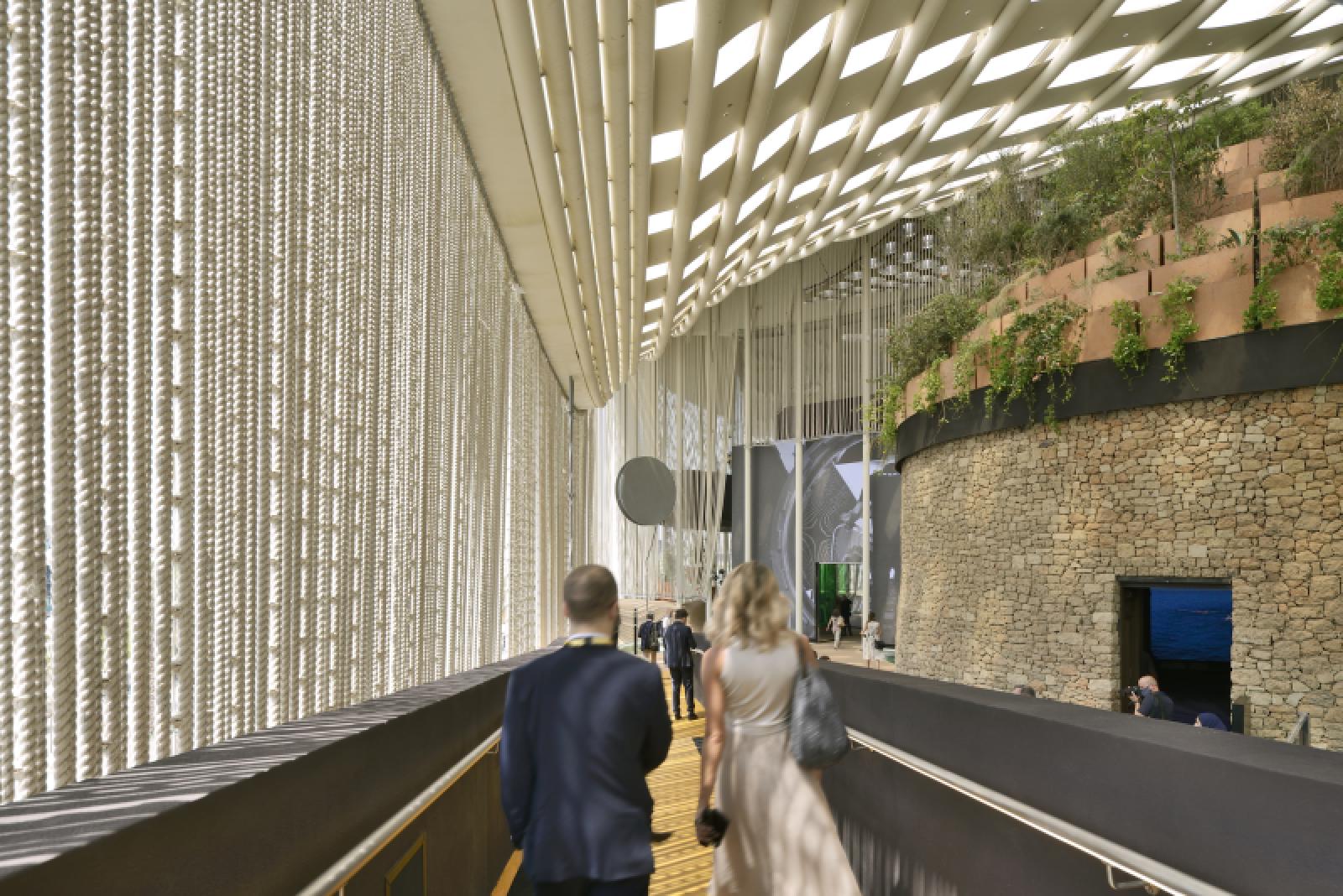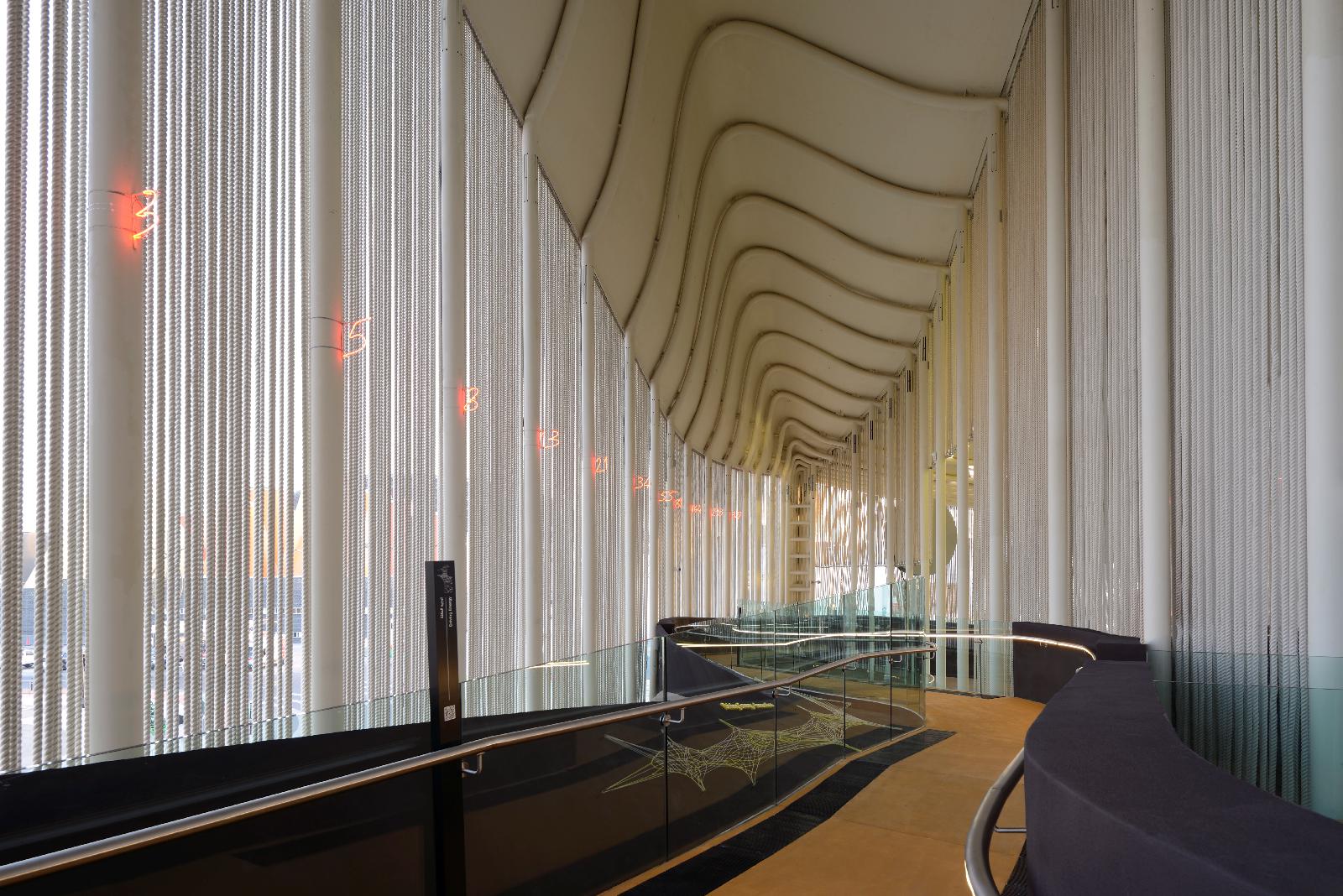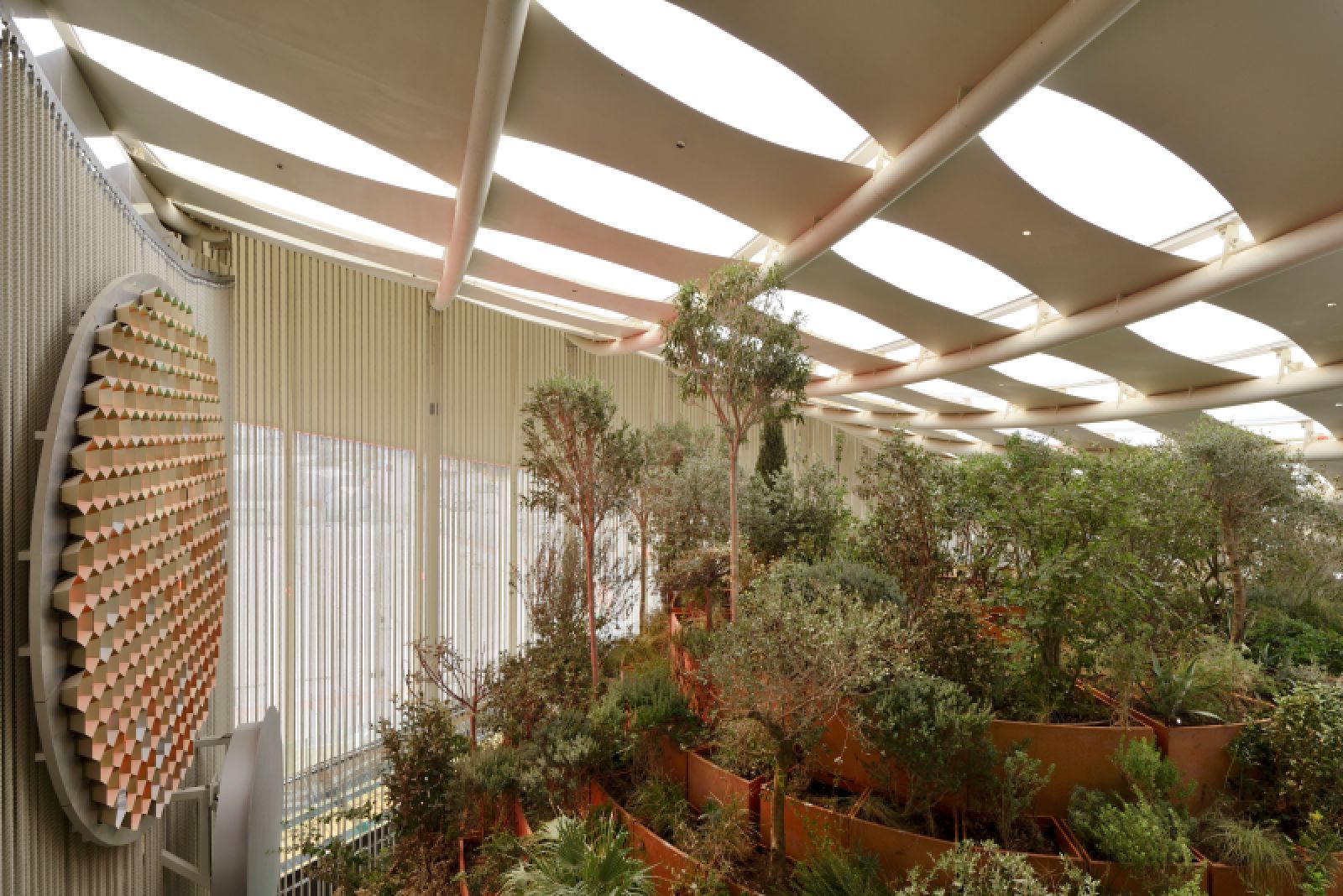The Italian Pavilion building at Expo Dubai 2020, designed by CRA-Carlo Ratti Associati and Italo Rota Building Office, with Matteo Gatto and F&M Ingegneria, was officially unveiled on October 1st, 2021, as part of the first World Expo ever held in the Arab world. The project puts forward an all-encompassing vision for reconfigurable architecture and circular design involving some of Italy’s most innovative companies.
The pavilion features a multimedia façade made with two million recycled plastic bottles, new types of building materials – from algae and coffee grounds to orange peels and sand – and an advanced system for climate mitigation that constitutes an alternative to air conditioning. Reusing is also fundamental to how the structure was conceived. The pavilion utilizes three real-sized boat hulls, which could potentially set sail after the event, to create and shape the roof of the building.
The Italian Pavilion extends over a surface of 3.500 square meters (38.000 square feet) and will be open until March 31st, 2022. The Italian Pavilion envisions an architecture which challenges how buildings are usually developed for temporary events such as a World Expo, in which a lot of newly-built structures end up as landfill after just a few months. Contrary to that approach, the Italian Pavilion was conceived as an architecture that is able to transform itself through time, in a sustainable fashion.
Three hulls, arrived in Dubai, become the roof of the pavilion, and after Expo, they could set sail to new destinations. The boat hulls also refer to the historical connections between the Italian and Arabian Peninsulas, thus hinting at the themes of both Italy’s participation in the Expo (“Beauty Connects People”) and Expo Dubai 2020 as a whole (“Connecting minds, creating the future”).
The three boat hulls that form the pavilion’s roof vary in length from 40 to 50 meters. They were produced with the contribution of Fincantieri, the largest shipbuilder group in Europe. The hulls are supported by more than 150 slender vertical steel pillars, each 27 meters high. In turn, they support a wave-shaped roof membrane made of ETFE pillows and a layer of perforated thin metal sheets that filter the sunlight. Seen from above, the hulls are coated in an innovative paint developed by paints and coatings company Gruppo Boero.
They are the three colors of the Italian flag – green, white, and red – and form what might be the biggest ‘tricolor’ in Italy’s history (2100 square meters – 22.600 square feet). The pavilion has no conventional walls. Instead, a curtain facade made of nautical rope, which also incorporates LEDs that can be lit to transform the facade into a multimedia surface, delineates the exhibition space. The nautical ropes are produced in recycled plastic, using the equivalent of roughly two million bottles, and form an intricate vertical meshwork that stretches almost 70 kilometers (43,45 miles) in length.

Photo © Michele Nastasi
At the close of the Expo, they will be reused again, in accordance with the logic of the circular economy. The use of the nautical ropes and a localized cooling system integrated with misting allow for extensive shading, natural ventilation, and better thermal comfort. The project strives to showcase more sustainable ways to cool our buildings and cities in the future. Visitors enter the Italian Pavilion’s interior path via an escalator that takes them to a skywalk suspended 11 meters above ground level, right below the first hull’s nave.
From this panoramic point, they can overlook the entire pavilion from a walkway that floats above the exhibition spaces and installations. Among the main spatial features are the Belvedere, a round structure topped by a dome, covered by wild herbs of the Mediterranean maquis, which evokes Renaissance gardens. Here, spirulina microalgae, cultivated by renewable energy company TOLO Green, enables the ecological treatment of air through the biofixation of the carbon dioxide emitted by visitors.
The path also includes an Innovation Space dedicated to technological research, the Second Sun and Second Moon digital installations by Enel X which create a crescendo of light effects closely linked to the visitors’ emotions in real-time, and the Theatre of Memory with a 3D-printed copy of Michelangelo’s David developed by the Museum of the Galleria dell’Accademia of Florence and the Ministry of Culture in partnership with the Department of Civil and Environmental Engineering at the University of Florence.
The ground floor of the pavilion features the “Solar Coffee Garden”, a cafe designed by CRA and Italo Rota for leading coffee company Lavazza. CRA and Italo Rota also designed an installation for global energy company Eni, titled “Braiding the Future”, which focuses on biofixation of carbon dioxide. It recreates a microalgae cultivation using a spectacular cascade of 20-meter-high technological liana vines.
Within each of the luminescent lianas flow the microalgae: the see-through circuit becomes a spectacular interpretation of the production technology of these unicellular organisms, which produce high-value compounds through a natural photosynthesis process. The technology of intensified biofixation of carbon dioxide that inspired the installation was developed in Italy by Eni, Politecnico di Torino, and start-up Photo B-Otic.
It allows the intensive cultivation of microalgae through photobioreactors, lit through LED technology optimized on specific wavelengths. Located at the entrance of the pavilion and suspended at full height over a body of water, the installation is a clear reference to Eni’s concrete commitment towards a sustainable future, including possible fixation and enhancement of carbon dioxide. It represents the next chapter in the company’s design collaboration with CRA and Italo Rota, which is dedicated to exploring new materials and solutions for the built environment.

Photo © Michele Nastasi
The rest of the Italian Pavilion also includes materials that were chosen in line with the circular approach, developed in collaboration with Mapei, which manufactures chemical products for the building industry. Coffee and orange peels left to dry and reduced to powder, are used to coat the suspended pathways and walkways. The pavilion itself rests on a dune five meters above ground level, made out of locally sourced sand.
Moreover, the path inside the Italian Pavilion is enriched by a series of green elements from more than 160 different species that live inside the building. Developed in collaboration with Italy’s National Research Council (CNR) and botanist Flavio Pollano, this natural landscape pays tribute to the biodiversity and ecological beauty of the Italian and Mediterranean territories. Particular attention is given to the role that plants play in stopping desertification.
- Location: Dubai, UAE
- Architect: CRA-Carlo Ratti Associati
- Project Team: CRA-Carlo Ratti Associati and Italo Rota Building Office, with Matteo Gatto and F&M Ingegneria
- CRA team: Carlo Ratti, Francesco Strocchio (Project manager), Monika Löve (Project manager), Luca Bussolino, Mario Daudo, Serena Giardina, Ina Sefgjini, Nicola Scaramuzza, Giovanni Trogu
- CRA Graphic Team: Gary di Silvio, Pasquale Milieri, Gianluca Zimbardi
- Past team members: Saverio Panata, Andrea Fasolo, Alberto Geuna, Gerolamo Gnecchi, Francesca Marino, Lucia Miglietta, Marco Maria Pedrazzo, Davide Ventura
- Italo Rota Building Office team: Italo Rota, Francesca Grassi
- Past team members: Francesco Lato, Omid Mohammad, Gilberto Piano, Sammy Zarka
- Matteo Gatto team: Matteo Gatto, Stefano Monaco, Barbara Corli, Valentina Rizzo
- Past team members: Paolo del Toro, Edoardo Perani
- F&M Ingegneria team: Sandro Favero, Federico Zaggia, Luigi Ranzato, Lorenzo Colarusso, Nicola Ros, Federico Moro, Antonio Nuzzo, Mauro Baessato, Davide Pizzolato, Dino Casagrande, Marco Furlanetto.
- Past team members: Francesca Favero, Luca De Antoni, Dhebora Gambaro, Francesco Mason, Alessandro Palamidese, Luca Sangiorgi, Paola Zisa, Mirco Zuin, Alessandro Bonaventura, Marco Bonaldo, Francesca Bertuzzo.
- Scenography design consultant: Alessandro Camera
- Lighting Design Consultant: Luminae Lighting Design (Lorenzo Bruscaglioni)
- Sound Design Consultant: P2A Design (Alessandro Pasini, Simone Fagnani, Paola Renda)
- Wayfinding Consultant: 100km studio (Luigi Farrauto)
- Graphic Consultant: studio FM milano
- Landscape Consultant: CNR (Silvia Fineschi, Roberto Reali, Francesco Carimi), GMP Studio (Flavio Pollano, Rachele Griffa)
- Year: 2021
- Photographs: Michele Nastasi, Courtesy of CRA-Carlo Ratti Associati








